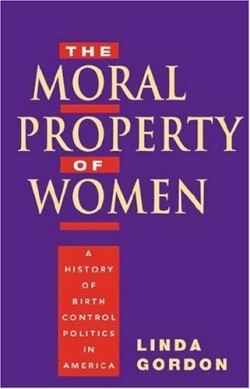
The Moral Property of Women
A History of Birth Control Politics in America
In the first years of the last century, a physician writing about reproduction lamented, “By that damnable sin-the avoidance of offspring-our women are no longer compelled to stay at home. Now woman has weaned herself from the hearthstone, and her chief end is self. Pray!” That physician was a proponent of a controversial theory, dominant from 1905 to 1910, which claimed that the unchecked birthrate of undesirable citizens, and fewer births of “quality” people, threatened race suicide. President Theodore Roosevelt even promoted the belief, calling women who elected to go childless selfish and self-indulgent, not fulfilling their “reproductive obligation.”
In this revised and updated version of a comprehensive history first compiled twenty-six years ago, the author traces birth control and the often controversial politics swirling around it during the past 200 years. The title comes from a phrase that the author heard used by the French prime minister of health nearly fifteen years ago, when he ruled that RU-486, also known as the abortion drug, could be placed on the market there. He called it “the moral property of women.” (Gordon’s 1976 version was titled Woman’s Body, Woman’s Right.)
Gordon begins with a prehistory of birth control-describing how Jewish women on the Lower East Side of New York City one hundred years ago tried to abort themselves by sitting over a pot of steam from stewed onions-and moves on through Victorian prudery and its reaction, the 1870s voluntary motherhood ideology, which had its roots in the early women’s rights movement. It’s sometimes difficult to follow the players-suffragists, moral reformers, free-love members, eugenists, socialists, sex radicals, the medical community-without a scorecard, but Gordon does a good job of pulling up blood-and-flesh examples of each. Ezra Heywood, for example, a free-love patriarch, endorsed male continence, a form of abstinence.
The social history moves chronologically; a large section is devoted to Margaret Sanger and the background of what was to become Planned Parenthood. Gordon, a professor of history at New York University, and author of The Great Arizona Orphan Abduction, which received the Bancroft Prize in 1989, has extensively researched her subject, so she is often able to throw out hard-to-believe information; for example, during the Depression, one enthusiastic soul proposed by law to limit families to two children.
Reviewed by
Robin Farrell Edmunds
Disclosure: This article is not an endorsement, but a review. The publisher of this book provided free copies of the book to have their book reviewed by a professional reviewer. No fee was paid by the publisher for this review. Foreword Reviews only recommends books that we love. Foreword Magazine, Inc. is disclosing this in accordance with the Federal Trade Commission’s 16 CFR, Part 255.
